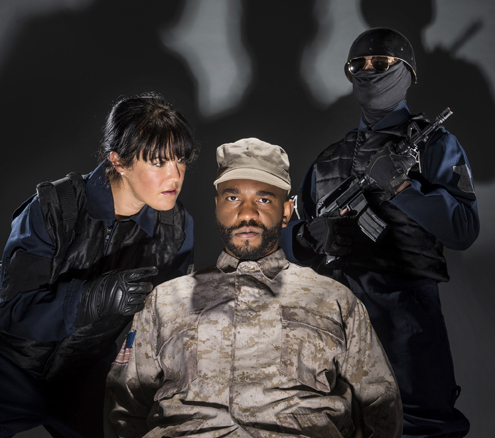
'Freedomland' asks tough questions amid music, laughs
By: Robert Sokol
July 8, 2015

It comes after a brisk, thoroughly engaging 90 minutes of narrative-advancing tunes and commedia-style double takes, rim shots and air quotes punctuating plot points of police brutality, voter suppression, data manipulation, immigration reform, racism and murder set in Anytown, USA.
Written by SFMT collective member Michael Gene Sullivan, with a score by Ira Marlowe and additional music by director Andrea Snow, “Freedomland” – which opened over the weekend in San Francisco’s Dolores Park and runs through September at many Bay Area locations – is, at its core, a family drama.
Malcolm (Sullivan), a self-professed ex-Black Panther, wants only to protect his orphaned grandson Nathaniel (George P. Scott), a recently returned Afghanistan vet, from the war zone that is life for a black man in America. It’s a relationship of palpable affection, tripped up by lovingly told lies and defiant youthful hubris.
The other primary characters are Lluis (Hugo E Carbajal), Malcolm’s sly undocumented upstairs neighbor who can turn the offer of a game of pinochle into a weapon of mass distraction; and newly-minted police academy graduate Emily Militas (Lisa Hori-Garcia), whose shiny passion for law and order gets as mud- and blood-spattered as the wartime deployment she lived under Nathaniel’s command.
The four engage in a minuet of absurdly conflicting ideals and realities. The head-scratching starts with a new normal where, depending on your melanin level, you are regularly detained at gunpoint – after having your front door kicked in – by a person whose salary you pay to serve and protect you from people who might kick in your front door and hold you at gunpoint.
These sorts of conflicts – and worse – are played honestly and for laughs, but without mugging, by the superbly talented actors, each of whom plays at least one other character, usually representing an opposing point on the play’s motivational continuum.
Carbajal morphs from likeable Latino gramps to a power-mad militia-building police captain. (“How am I supposed to fight the war on drugs without the weapons of war?”)
Sullivan also delivers a strong 180 as the self-hating black mayor of a racially divided town who is clinging to his waning political capital. Together the venal pair concocts a scheme to suppress the rights and voice of any who oppose them.
The production should break under the weight of its content aspirations, but playwright Sullivan and director Snow keep the pathos on simmer until the end. The laughs, served in a steady flow, are justly earned and make it almost too easily bearable to consider the tragic situation on display.